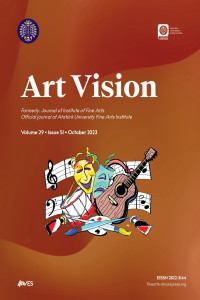Abstract
Absürd Tiyatro eğilimi, 2. Dünya Savaşı sonrasında Avrupa’da ortaya çıkan ve dünyaya fırlatılmış insanın varoluş sancısını, trajedisini, yalnızlığını traji-komik bir dille sahneye aktarır. Aynı dönemde Doğu Avrupa ülkelerinde yaşanan demir perde baskısı da insanları benzer bir yalnızlığa itmiştir. Her an iktidar tarafından gözetlenen insanlar korkuya teslim olmuşlardır. Bu çalışma Doğu Avrupa Absürd Tiyatrosu’nun önemli temsilcilerinden Vaclav Havel’in Görüşme-Kutlama-Çağrı oyunlarını Michel Foucault’nun panoptikon felsefesi üzerinden incelemektedir. Gözetlenme korkusunun yol açtığı panikle paranoyaklaşan toplumda gerçek, absürd bir oluş ve durumlarla kavranabilmektedir. Havel, Çek toplumunun yaşadığı koşulları oyunlarına yansıtır. Çoğu zaman gerçek ve absürd arasındaki fark kapanır. İktidarların yarattığı bu saçma düzeni Foucault siyasi ve felsefi bakımdan, Havel ise estetik açıdan yorumlamıştır. İktidarın yüzünün türlü cezai yaptırımlarla görüldüğü Havel oyunlarının hiçbirinin sonunda bir umuda rastlanmaz. Absürd tiyatro uyumsuzluğun, umutsuzluğun ve eylemsizliğin altını çizer. İnsanlar şeffaf prangalarla hapiste gibi yaşar gibidir. Absürd tiyatro eğilimi içindeki ‘insanın dünyaya fırlatılmışlığı’ trajedisi, Havel’in Çekoslovakya’sına fırlatılmış insanların Kafkaesk çaresizliği üzerinden işler.
Keywords
References
- Anticharter. (2023, 27 Nisan). Wikipedia içinde. https://en.wikipedia.org/wiki/Anticharter.
- Debord, G. (1996). Gösteri toplumu (1. Baskı) (O. Taşkent & A. Ekmekçi, Çev.). Ayrıntı Yayınları.
- Esslin, M. (1999). Absürd tiyatro (1. Baskı) (G. Siper, Çev.). Dost Kitabevi Yayınları.
- Ethz. (t.y.). Declaration of charter. 27 Nisan 2023 tarihinde https://www.files.ethz.ch/isn/125521/8003_Charter_77.pdf adresinden alındı.
- Foucault, M. (1992). Hapishanenin doğuşu (1. Basım) (M. A. Kılıçbay, Çev.). İmge kitabevi.
- Foucault, M. (2014). Özne ve iktidar (4. Basım) (I. Ergüden & O. Akınhay, Çev.). Ayrıntı Yayınları.
- Furedi, F. (2001). Korku kültürü (1. Baskı) (B. Yıldırım, Çev.). Ayrıntı Yayınları.
- Han, B. (2017). Şeffaflık toplumu (2. Baskı) (H. Barışcan, Çev.). Metis Yayınları.
- Han, B. (2017). Şiddetin topolojisi (2. Basım) (D. Zaptçıoğlu, Çev.). Metis Yayınları.
- Havel, V. (1990). Görüşme, kutlama, çağrı (1. Baskı) (E. T. Çelikkan, Çev.). Remzi kitabevi.
- Pavel Kohout. (t.y.). Pavel Kohout international concert organist. 27 Nisan 2023 tarihinde http://www.pavelkohout.org/ adresinden alındı.
- Sanitation. (2023, 27 Nisan). Wikipedia içinde. https://en.wikipedia.org/ wiki/Sanitation
- Şener, S. (2006). Dünden bugüne tiyatro düşüncesi (4. Baskı). Dost Kitabevi Yayınları.
- TDK. (t.y.). Absürd. Güncel Türkçe Sözlük. 27 Nisan 2023 tarihinde https:// sozluk.go.tr/ adresinden alındı.
Abstract
The Absurd Theater trend transposes the existential pain, tragedy, and loneliness of the human being, which emerged in Europe after World War II and were thrown into the world, to the stage in a tragicomic language. During the same period, the iron curtain oppression in Eastern Europe also pushed people into similar loneliness. People who are watched by the government at any moment have succumbed to fear. This study examines the plays Audie nce-U nveil ing-P rotes t by Vaclav Havel, an important representative of the Eastern European Theater of the Absurd, through Foucault's philosophy of the panopticon. In the society that becomes paranoid with the panic caused by the fear of being watched, reality can be grasped through an absurd occurrences and situations. Havel reflects the conditions experienced by Czech society in his plays; often, the difference between the reality and the absurd blurs. Foucault interprets this absurd order created by the powers in terms of political, Havelesthetic point of view. A hope is found at the end of none of the plays, which are witnessed various punitive measures. Absurd theater emphasizes disharmony, hopelessness, and inaction. People live as if in prison with invisible chains. Havel discusses the tragedy of “human being thrown into the world,” within the trend of Absurd Theater, through the Kafkaesque desperation of people thrown into the geography of Czechoslovakia.
Keywords
References
- Anticharter. (2023, 27 Nisan). Wikipedia içinde. https://en.wikipedia.org/wiki/Anticharter.
- Debord, G. (1996). Gösteri toplumu (1. Baskı) (O. Taşkent & A. Ekmekçi, Çev.). Ayrıntı Yayınları.
- Esslin, M. (1999). Absürd tiyatro (1. Baskı) (G. Siper, Çev.). Dost Kitabevi Yayınları.
- Ethz. (t.y.). Declaration of charter. 27 Nisan 2023 tarihinde https://www.files.ethz.ch/isn/125521/8003_Charter_77.pdf adresinden alındı.
- Foucault, M. (1992). Hapishanenin doğuşu (1. Basım) (M. A. Kılıçbay, Çev.). İmge kitabevi.
- Foucault, M. (2014). Özne ve iktidar (4. Basım) (I. Ergüden & O. Akınhay, Çev.). Ayrıntı Yayınları.
- Furedi, F. (2001). Korku kültürü (1. Baskı) (B. Yıldırım, Çev.). Ayrıntı Yayınları.
- Han, B. (2017). Şeffaflık toplumu (2. Baskı) (H. Barışcan, Çev.). Metis Yayınları.
- Han, B. (2017). Şiddetin topolojisi (2. Basım) (D. Zaptçıoğlu, Çev.). Metis Yayınları.
- Havel, V. (1990). Görüşme, kutlama, çağrı (1. Baskı) (E. T. Çelikkan, Çev.). Remzi kitabevi.
- Pavel Kohout. (t.y.). Pavel Kohout international concert organist. 27 Nisan 2023 tarihinde http://www.pavelkohout.org/ adresinden alındı.
- Sanitation. (2023, 27 Nisan). Wikipedia içinde. https://en.wikipedia.org/ wiki/Sanitation
- Şener, S. (2006). Dünden bugüne tiyatro düşüncesi (4. Baskı). Dost Kitabevi Yayınları.
- TDK. (t.y.). Absürd. Güncel Türkçe Sözlük. 27 Nisan 2023 tarihinde https:// sozluk.go.tr/ adresinden alındı.
Details
| Primary Language | Turkish |
|---|---|
| Subjects | Fine Arts Education |
| Journal Section | Review |
| Authors | |
| Publication Date | October 31, 2023 |
| Published in Issue | Year 2023 Volume: 29 Issue: 51 |
Content of this journal is licensed under a Creative Commons Attribution NonCommercial 4.0 International License

